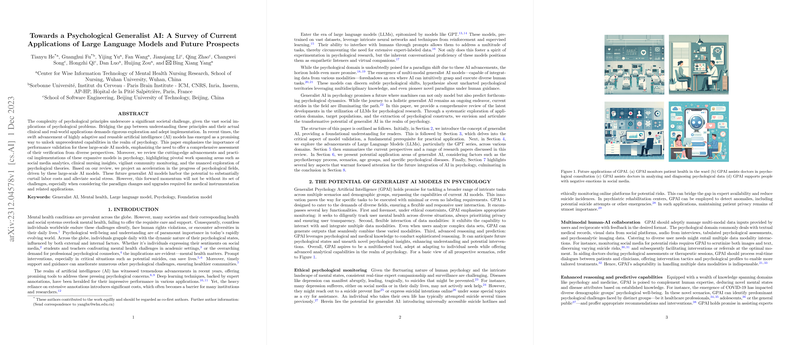Introduction
Understanding and addressing mental health conditions is a critical societal issue that affects individuals globally. Despite growing recognition of mental health's importance, there remain significant challenges in providing adequate care and support. This is where AI, particularly LLMs like GPT, comes into play. These models, with their extensive pre-training on diverse datasets, offer the potential to transform the field of psychology. By guiding individuals through their emotional states, enhancing social media analytics for mental health insights, and supporting clinical decision-making, AI is on the brink of reshaping psychological practices and theory.
Potential of Generalist AI in Psychology
The promise of Generalist Psychology AI (GPAI) is vast, with the capacity to handle complex tasks traditionally addressed by human experts. The flexibility of GPAI allows for nuanced monitoring of mental health, integration of diverse data modes, and advanced reasoning with predictive capabilities. For instance, in clinical settings, GPAI could aid in patient intake by evaluating psychological states and suggesting treatment actions. In communities, AI could direct mental health awareness campaigns or detect early signs of psychological distress. Online, AI might monitor posts for detection of distress, offering resources or alerting support networks. As we navigate the ever-growing digital landscape, GPAI's potential to offer real-time, ethical, and non-judgmental interactions could be pivotal in improving psychological well-being on a global scale.
Challenges and Evaluation of LLMs
Despite the optimism surrounding LLMs in psychology, it's crucial to assess their performance rigorously. Studies have used task-specific evaluations to discern how well LLMs understand emotional awareness, recognize emotions, and classify mental health conditions such as depression or suicidality. Although advances like GPT-3.5 have shown remarkable performance improvements, consistent and unbiased evaluation is key. The essence of model evaluation extends beyond clinical applications to understanding how LLMs process social interactions and simulate real-world scenarios. By thoroughly evaluating these models across varied psychological contexts, we can better harness their potential while acknowledging their limitations.
Applications and Progress of LLMs in Psychology
The applications of LLMs span across digital media, clinical settings, and community endeavours. They've been used to enhance digital platforms for sentiment detection, and construct intelligent chatbots that provide empathy and support. Clinically, they assist in psychological counseling and patient care. Communities benefit from the detection and intervention tools AI provides for mental health screenings, especially for vulnerable populations like children and adolescents. Academic institutions utilize AI to foster student well-being, while on social media, AI can offer tools for positivity and detect online harassment. The progress in applying LLMs is not without challenges, yet the innovative explorations in this field are paving the way for more responsive and efficient psychological services.
Looking Forward
As the development of generalist AI in psychology marches on, it is imperative to consider ethical implications and privacy concerns. The transition to using open-source, pre-trained models offers a cost-effective way to adapt advanced AI tools for specific needs. However, it is crucial to ensure multi-domain validation, navigate ethical complexities, and safeguard user privacy. By addressing these practical issues with vigor, AI can become an invaluable ally in improving mental health worldwide. The conclusion, therefore, is not an end but the beginning of a journey towards a reality where generalist AI plays an integral role in augmenting psychological well-being and treatment.
